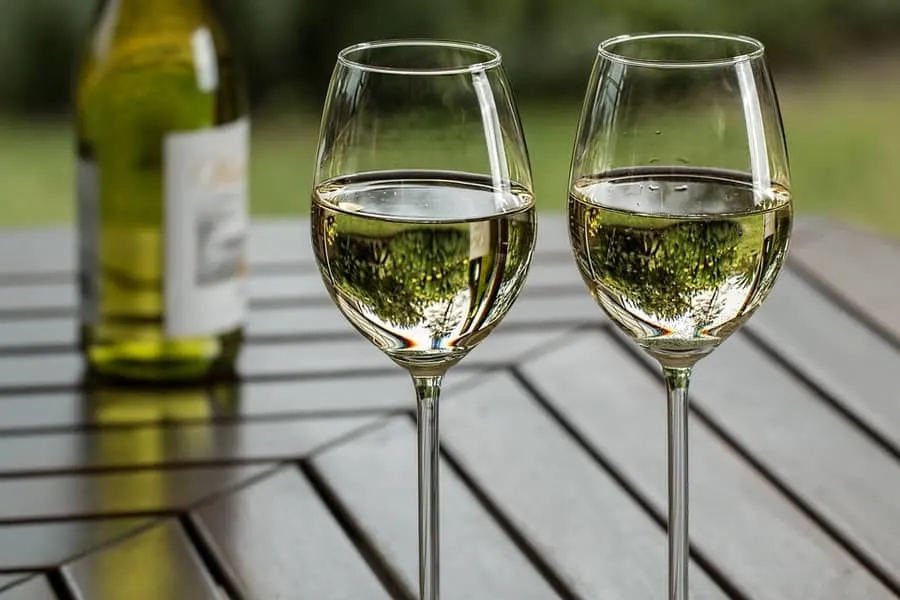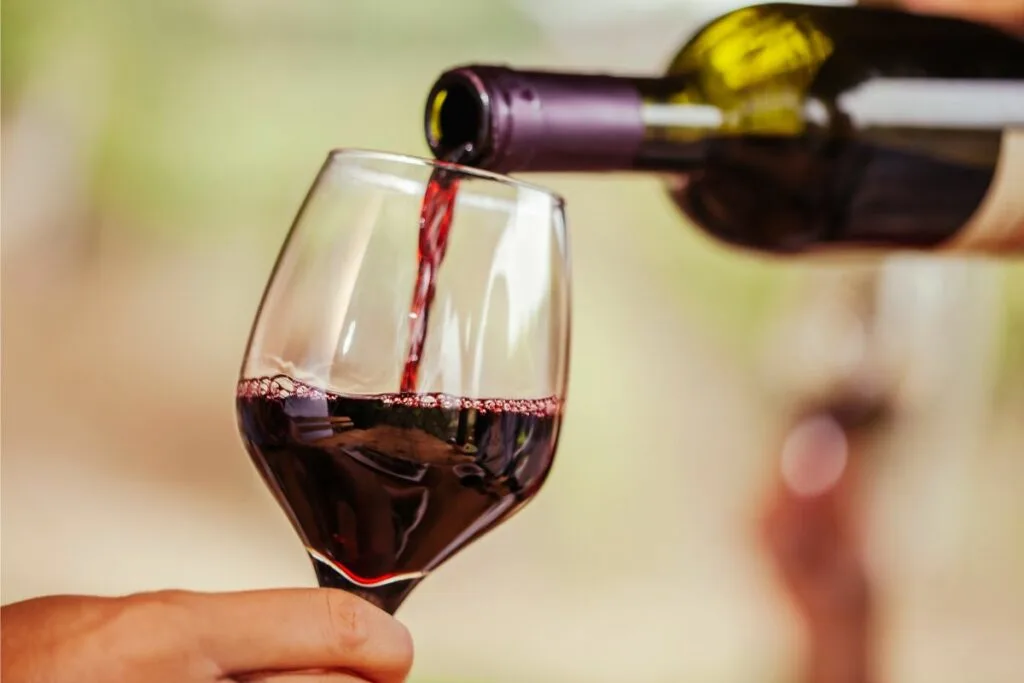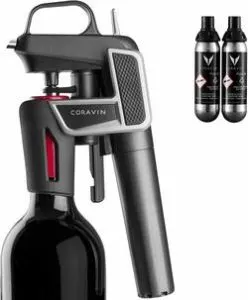As an Amazon Associate, I earn from qualifying purchases with no additional costs for you.
You’re ready to enjoy that glass of red organic wine you’ve been saving, but when you take a sip, the bitter taste hits you like a mountain of paperwork. We’ve all been there before, but it begs the question: how long does organic wine last once it’s been opened?
How long does organic wine last once opened? On average, organic wine can last up to three days after being opened. Red organic wine can last between 3 and 5 days, while white organic wine can last between 3 and 7 days.
Due to the different types of wines, levels of tannins, and storing methods, these periods may vary from bottle to bottle. However, there are simple ways of extending the life expectancy of an opened bottle of wine.

TIP: If you want to check out the best refrigerator for wine storage, I recommend trying out the Avation (18 bottles) compressor refrigerator with Wi-fi smart app control cooling system. You can find this refrigerator by clicking here (Amazon link).
Can Organic Wine Go Bad?
Before we answer this question, let’s talk about the rigorous process which it takes for a wine to be labeled as “Organic.”
Regardless of price, wines are typically labeled with the following three options:
1. “Organic Wine” – These wines are processed and made with grapes that meet the USDA organic standards.
“That is, the grapes are grown without GMO seeds, synthetic fertilizers, synthetic fungicides, synthetic herbicides, or growth hormones at all. “The winemaker may not add any [sulfur nor] sulfites to the wine at any stage…[and]…everything in the cellar is again certified under USDA organic standards, and no chemicals are allowed in the winemaking, equipment, bottle or tank cleaning process.” (source: Triton Wines)
2. “Wine Made from Organic Grapes” – These wines are made with USDA-certified organic grapes following all the same high standards as “Organic Wine”; however, the winemaker has added sulfur and/or sulfites to the mixture during the winemaking process.
3. Other/Non-organic – This label applies to any wines that are not made with USDA-certified organic grapes. This does not automatically mean sulfur and/or sulfites have been added to the mixture, but usually, the label on the bottle of wine will clarify whether or not it has been added.
It may sound dangerous to add sulfur to anything, but wine grapes (and most organic compounds) have naturally occurring sulfites that lower the bacterial count during processing.
This protects the wine from spoilage and further protects the general taste and smell, and can even protect the consumer from an allergic reaction involving the sinus tissues.
Because sulfites naturally occur during the process and some winemakers choose to add synthetic sulfites to their mixtures, there is no long-lasting advantage to buying organic wine versus non-organic wine. Thus, organic wine can go bad, and usually around the same time as non-organic wine.
In a 2014 study by Costanigro & colleagues, it was reported that many consumers believe the sulfites in wine cause headaches and that these consumers are much more likely to buy into marketing aimed at sulfite-free wine and pay more for it.
Another study performed by D’Amico & colleagues in 2016 also confirmed this bias toward more organic non-sulfite wines.
How Do You Know Organic Wine Has Gone Bad?

Though some organic wines naturally have a drier, tannin taste, it is still easy to recognize when a bottle has spoiled. Even before pouring out a glass.
One main tale-tell sign is the smell. If the wine smells moldy, musty, vinegary, or like a frat boy’s basement, maybe don’t serve it at your boss’s dinner party. The aroma would seem sharp and abrasive, almost like nail polish remover or paint thinner.
Another easy tell is color. Does your Merlot suddenly look brownish? Is your Moscato resembling an old sponge? Chances are your bottle has spoiled (or “corked”) beyond repair.
How much time has passed since you opened the bottle can also be a key factor in knowing whether or not it has gone bad. Typically, the rule with bottled wine is about one week after it has been opened, it should be dumped out.
If the wine seems cloudy, especially if the wine was clear when purchased, this can indicate that the wine has spoiled. Not only that, but it could also mean that microorganisms have found their way into the bottle and are populating it.
Finally, check the taste. If it doesn’t taste like you expect it to or has a vinegar taste, that’s a clue that it may have corked. However, if your wine seems fizzy without being sparkling, that indicates it has gone through a second fermentation.
TIP: To find out a few of the common reasons why your organic wine has changed color, read this article. If sustainability is part of your lifestyle, recycling your wine bottles and corks would be a good option. Read all about recycling here.
Is It Safe to Drink Old, Opened Organic Wine?

Technically yes, but you need to consider the fact that drinking opened organic wine after its expectancy will not have a pleasant taste by any means. Also, bear in mind that the flavor of the organic wine will change as soon as 24 hours after opening.
You are safe to drink the old open wine because the process of making wine preserves it. Alcohol is an antiseptic, meaning it kills bacteria, and the alcohol present in wine is no different.
However, it doesn’t work like a hand sanitizer and won’t kill all the bacteria present. So, when it is exposed to oxygen, it is also exposed to bacteria, which further breaks down those sulfide bonds. The free-floating sulfites are what cause the change in taste/smell and will ultimately spoil the wine.
A wine that has spoiled due to bacterial infection may cause an extremely bitter and sharp taste along with a cloudy look to the wine.
Although bacteria have been introduced to the opened bottle, the fermentation process used to create the wine in the first place should protect it and you from infection.
Although organic red wines have higher tannins, which will protect them from the effects of oxidation, and can last longer unopened than organic white wines, both will eventually oxidize.
This oxidation will not make you sick, but the bad taste might! The only way old opened wine would be advised against drinking is if the second fermentation has occurred. This can be spotted by the acidic scent of organic wine, almost like vinegar. However, it is still technically safe to drink.
TIP: Do wine grapes contain alcohol, and why does wine ferment in the bottle? Find out the answer to these questions and more in these well-researched articles!
Recommendation box: Everything you need to enjoy your wine as much as possible. All recommended products are personally tested and regularly used by experts from this website (Amazon links):
> Ivation Wine Cooler – Energy-efficient wine cooler for 18 bottles with Wi-fi smart app control cooling system.
> Wine Rack – Beautiful, elegant wood rack for up to 7 bottles and the choice of vertical or horizontal storage.
> Durand Wine Opener – Classic vintage wine opener (we like all these classic staff).
> YouYah Iceberg Wine Decanter – The most beautiful and handy wine decanter we personally use.
> Bormioli Rocco Wine Glasses – A set of eight elegant and traditional wine glasses made in Italy.
> Vintorio Wine Aerator – Simple but really useful wine aerator for a reasonable price.
> The Original Vacu Vin Wine Saver – The best wine saver on the market in a package with two vacuum stoppers and two wine servers.
And if you want to become a true connoisseur of wine, we recommend reading the book Wine Folly: The Essential Guide to Wine (Amazon link), where you will find all the information you need about winemaking, wine varieties, flavors, and much more.
Best Methods to Prolong Opened Wine Life
1. Avoid Oxygen- Once you pop the cork on a bottle of wine, its contents begin the process of oxidation. This is what causes spoilage and foul taste. To avoid this as much as possible, recork your bottle after every glass.

2. Proper Storage- Red wines may need to be stored in a completely different environment than white wines. It is recommended for ideal wine storage long-term that white and lighter wines be placed in a wine refrigerator, whereas reds and more fortified wines are better in a cool, dark location.
I feel like you could store reds and white wines in a good dual-temperature zone wine refrigerator. Limit heat and light exposure to the wine as much as possible.
TIP: Find out the correct way to store white wines and red wines in these informative articles.
3. Coravin wine system- The future is now with this system! It extracts the wine through the cork and replaces any air in the bottle with safe argon gas. With this method, you never have to open the bottle and can sample the wine by the glass for months and possibly years. This method is very common in wines on the higher-priced side.
TIP: Most wines go bad once you pop the cork within a day or so. But a Coravin Wine Preservation system (available for a great price on Amazon) can extend the life of your opened wine for weeks or even months. It is awesome. You should check it out to see if it fits your lifestyle.
4. Wine Preserver- Though, if the Coravin wine system is a bit pricey for your wine-loving budget, try a wine preserver. It creates a vacuum within the bottle, keeping the wine from oxidizing and extending the wine’s lifespan. For a complete guide to wine stoppers, check out this write-up.
In conclusion, every bottle of wine will need its specific environment, temperature, and even storing method to ensure the best flavor for the longest extension of time. No matter if the wine is organic or not, the ideal storage recommendation should be stated on the label.
As a general rule of thumb, organic wine should be enjoyed within three days of opening and recorked after every glass. For a more comprehensive guide for storing unopened red wine, check out this article.
So, invite your friends and family over for a “wine down” before that bottle goes to waste and happy drinking!
TIP: Are you interested in buying a wine stopper? We’ve personally tried and recommend buying one of these wine stoppers (Amazon links):
- The Original Vacu Vin Wine Saver: Our top choice. Very easy-to-use wine stopper/saver. You can enjoy a glass of fresh wine whenever you want without worrying about wasting any.
- EZBASICS Wine Saver: Great alternative to Original Vacu Vin Saver. This wine stopper keeps the flavor of wine for up to one week.
- Champagne Stopper by MiTBA: Wine stoppers for sparkling wines are different. This wine stopper seals your bottle and increases the pressure so your beverage’s bubbles won’t go to waste.
TIP: Check out this page for a complete list of wine products and accessories I love. You’ll find my recommendations for wine refrigerators, decanters, and aerators and the best place to buy wine online. Click here to see the complete listing.
Scientific Literature Referenced:
Costanigro, M., Appleby, C., & Menke, S. D. (2014). The wine headache: Consumer perceptions of sulfites and willingness to pay for non-sulfite wines. Food Quality and Preference, 31, 81-89. DOI:10.1016/j.foodqual.2013.08.002 (via Science Direct)
D’Amico, M., Di Vita, G., & Monaco, L. (2016). Exploring environmental consciousness and consumer preferences for organic wines without sulfites. Journal of Cleaner Production, 120, 64-71. DOI:10.1016/j.jclepro.2016.02.014 (via Science Direct)
